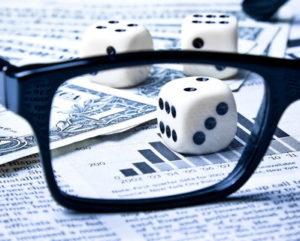 If you’re a sports bettor, you’ll know that markets are driven by their odds. When you visit a sportsbook, you see the odds on the game(s) that you want to bet on, and if this is favourable for you and you think the prices represent a fair value of the actual chances, it is usually the case that you proceed with placing a wager. Of course, those odds can also change in the days and weeks leading up to an event taking place.
If you’re a sports bettor, you’ll know that markets are driven by their odds. When you visit a sportsbook, you see the odds on the game(s) that you want to bet on, and if this is favourable for you and you think the prices represent a fair value of the actual chances, it is usually the case that you proceed with placing a wager. Of course, those odds can also change in the days and weeks leading up to an event taking place.
Odds prices do not, however, reflect the true probabilities of an outcome happening. Odds are initially set based on form and data but once people start betting on those markets the odds can then change based on the risk to the bookie. I.e. if a bookmaker has a lot of exposure and one outcome over another it will shorten the odds it is over-exposed on and lengthen the corresponding odds. They do this to ensure a balanced book but in actual fact the true probabilities have not changed much. This is why very big bets especially can move entire odds markets, when underlying that nothing has really changed.
Here, we’ll take a look at how and why betting odds change in general, and then what occurs whenever someone places a large bet on an event.
Why Do Betting Odds Change?
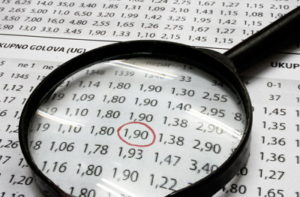 We will look at two examples here to explain the reason why odds change. If you were to bet on a coin toss outcome, then the result is either heads or tails. You have a 50% chance of being right with your wager, and the same remains true at any point before the toss of the coin occurs.
We will look at two examples here to explain the reason why odds change. If you were to bet on a coin toss outcome, then the result is either heads or tails. You have a 50% chance of being right with your wager, and the same remains true at any point before the toss of the coin occurs.
On the other hand, if we look at sporting events and financial markets, there is no similar controlled certainty. Therefore, the chance on a given outcome (or the odds, as it would be) can change in the time period prior to the event taking place. And the likelihood is that those odds will change in that timeframe.
A number of things can affect the odds in place, but the primary factors coming into play are new information regarding a team or a player, market confidence where more information drives more liquidity, and money, because where the money is being wagered determines which way the odds move.
The more uncertainty there is regarding a specific outcome, the less confidence there is from bettors in that result occurring. As a consequence, that particular result will have poor liquidity, poor bookie prices and large spreads at exchanges. When the event is a lot closer to taking place, some of the uncertainty from the original pricing is dismissed, as more information is known, and this results in increased confidence from bettors.
A bookie that is confident in their initial assessment could opt not to alter the odds. Yet in not doing so, it could result in them being out of line with other sports betting providers, and therefore be overly exposed on a specific given outcome. Rather than taking that risk, bookmakers would simply adjust the odds based on the flow of money. The more money being wagered on a specific outcome will result in the odds shortening and the alternatives lengthening.
At the end of the day bookmakers don’t like risk they prefer certainty. This is why they try to achieve a balanced book, an equal proportion of money bet on all possible outcomes, that ensures they make a profit whatever happens. This isn’t always possible and sometimes bookies have to take a position that means they could stand to lose if a specific outcome happens. They will do whatever they can, though, to minimise that exposure and the best way of doing that is shortening the odds on the outcome they are over-exposed on and increasing the odds on the other outcomes to attract more bets on them; to try to achieve a balanced book.
Big bets therefore move odds markets but in reality when this happens nothing has changed in the physical world that change the actual probabilities. Many professional gamblers look for markets that are under-exposed as often the odds can be better than true probability. Back these types of markets often and you can increase your overall value.
Big Bets Move Odds In College Football Game
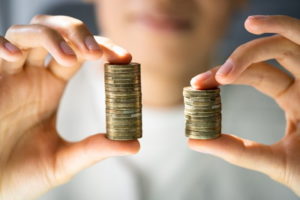 An example of large money bets adjusting the odds of a market comes about with college football in the United States. Georgia and Alabama were set to meet in a game on Monday, January 10 at 8 p.m. EST.
An example of large money bets adjusting the odds of a market comes about with college football in the United States. Georgia and Alabama were set to meet in a game on Monday, January 10 at 8 p.m. EST.
The Georgia Bulldogs entered this week as the three-point favourites to win over their Alabama Crimson Tide rivals. Back in December, when the two teams first met, Georgia was a six-point favourite to win, making the line on next week’s showdown visibly lower. On New Year’s Eve, two oddsmakers at the SuperBook Westgate Las Vegas compared their numbers. Considering that the Crimson Tide took care of the Cincinnati team and the Georgia Bulldogs made light work of Michigan, the oddsmakers landed on a -1.5 figure. Yet other sportsbooks would open higher, with Georgia being -2 or -2.5, and this remained the case right up until New Year’s Day. It was at this point that huge bets turned the tide significantly in favour of the Bulldogs.
Ed Salmons, the vice president of risk management for SuperBook, said that he didn’t want to go to -3 for Georgia until a real bet was placed on the team winning. That occasion came, with a respected player utilising the -2.5 odds on Georgia and placing a huge wager of $40,000 on the team. This led to the -3 line being brought into play.
At around the same time, it was reported that the Caesars Sportsbook had taken two bets for $110,000 on the Bulldogs being victorious, and this prompted the line to grow as well. Craig Mucklow who operates as the director of trading for Caesars said that the same bettor had also chosen to back Georgia to win the national title at +135 before the semi-finals.
Yet even with the big bets being placed on the Georgian team, a larger number of bets – 70%, in fact – and a bigger portion of money (68%) had been placed on the Alabama side via the Caesars sportsbook by Sunday afternoon.
Additional large bets on the Bulldogs will likely push the number again, potentially reaching the six-point favourite spot that it experienced in December of 2021.
Horse Racing Fan Wins Big After 2/1 Backing
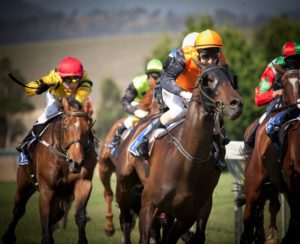 In April of 2021, it was reported by The Sun that a punter had proceeded with placing a huge bet on a horse in the Grand National Festival. While the bettor in question chose to remain anonymous, their selected horse Fakir D’oudairies was the favourite for the race, with odds of 2-1 given on it. The six-year-old horse, which is owned by JP McManus – a billionaire in the racing scene – went on to dominate the race, as expected.
In April of 2021, it was reported by The Sun that a punter had proceeded with placing a huge bet on a horse in the Grand National Festival. While the bettor in question chose to remain anonymous, their selected horse Fakir D’oudairies was the favourite for the race, with odds of 2-1 given on it. The six-year-old horse, which is owned by JP McManus – a billionaire in the racing scene – went on to dominate the race, as expected.
Prior to the race taking place though, the anonymous punter opted to place a massive £195,000 wager, backing it as the winner. With odds of 2-1 given on the horse at the time, this meant that the bettor obtained a fantastic £390,000 in profit from its victory, offering a total return of £585,000 altogether. That being said, it was suspected that McManus himself was responsible for the large wager, considering he is well-known for his love of a punt. It wouldn’t be a surprise either, as he had previously won massive amounts from betting at Cheltenham Festival with a £100,000 wager on Reveillez at 6-1 in 2006.
Horse racing is known to bring in some vast wagers, regardless of which event is taking place. This one on the Grand National is just one of many that likely took place during the same race and the same festival.
Without a doubt, this particular bet alongside the others helped to not only propel Fakir D’oudairies to the top as definitive winner of the race but helped to shape the odds being offered on it as the days went by prior to the race taking place. Only a couple of days prior to the race taking place, the horse was still one of the favourites, but at odds of 11/4 with many bookmakers. Yet with many betting tip sites and veteran gamblers taking notice of the horse’s form, wagers came in thick and heavy, helping to adjust the odds to 2/1.
To provide an example of how this would have differed the outcome, a bet calculator can provide the total payout for a bet that was placed on Fakir D’oudairies when the odds stood at 11/4. Let’s say that the aforementioned £195,000 wager had been placed on the horse winning while it was given those odds. If this was the case, then the total profit would have been £536,250, resulting in a total return of £731,250 for the bettor.
Of course, because many people had realised and understood that the horse was a sturdy favourite in the race, more bets had been placed on it over the course of the few days prior to the race occurring. Therefore, because a larger number of people were betting on Fakir D’oudairies to win the Grand National race several days before it took place, the odds were adjusted due to bookmakers wanting to ensure they are in profit and not paying out too much to punters. Without that flurry of activity on the horse beforehand, the potential was there for a smaller number of bettors to have benefitted from the more favourable 11/4 odds.
Why Do Odds Change So Often?
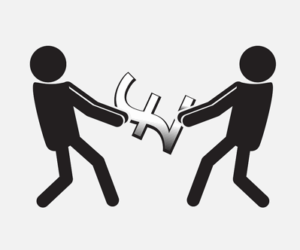 Even when values have been determined by sportsbooks in the initial stages, the variable utilised to create these will almost always go through a change. Players can suffer injuries, teams are restructured for various reasons, and even outside events beyond the control of anyone can affect the outcome of an event. It is therefore necessary to expect market odds to change for one reason or another.
Even when values have been determined by sportsbooks in the initial stages, the variable utilised to create these will almost always go through a change. Players can suffer injuries, teams are restructured for various reasons, and even outside events beyond the control of anyone can affect the outcome of an event. It is therefore necessary to expect market odds to change for one reason or another.
The direction that the odds veer to and the degree by which they change are things that are no easy to predict, though. An example of this, are political bets made in 2017 on the snap general election determining who would serve as the Prime Minister of the United Kingdom once votes had been counted. At the time, Theresa May’s Conservative party started out with a huge lead of 20 points, giving her an 88% chance of re-election. Through the proceeding days and weeks though, campaigns continued by Jeremy Corbyn of the Labour party thrust him forward, while May’s continued moments of idiocy saw her party wobble. As a result, Corbyn’s odds of becoming PM dropped to 10/11 on the eve of the election, before they balanced back out to 20/1 when May evened the territory. A lot of the odds movements were caused by bettors backing their respective favourites.
Despite fluctuations in odds though, if Corbyn had gone on to win the election and someone had placed a bet on him doing so when the odds were at 10/11, those odds would be safe for that bettor. Just because they balanced out to 20/1 later on doesn’t mean that bettor would have had to make do with the new odds. The odds are saved at the time of the bet being placed.
Of course, bookmakers want to ensure that they aren’t paying out huge amounts to their registered gamblers. Sportsbooks can make mistakes when determining odds for any event or occurrence. Situations can arise that make the odds in place very sympathetic towards the punters, and bettors will scramble to take advantage of such instances. This results in the bookmakers then taking their own speedy course of action to try and balance the books, thereby mitigating their own losses from players taking advantage of favourable odds.
In the end, the bookies are always trying to maintain an income, and this is why odds will more-often-than not lean in their favour. Bettors can exploit mistakes that they spot easily enough, though.
When it comes to large bets being placed on a market, these will result in huge payouts if they are successful. Therefore, a bookmaker spotting players laying down high wagers will act accordingly to reduce the risk of having to pay out massive amounts to multiple players. And in the aforementioned case of the Grand National horse race, this action was clearly undertaken when bettors started wagering on Fakir D’oudairies. That could have been due to a few large wagers being placed on the horse or masses of players placing smaller bets on it winning.
The outcome of that remained the same, though. The odds provided on the horse reduced to 2/1 so that the sportsbooks were covering their own backs and ensuring they didn’t have to pay out masses of money.
